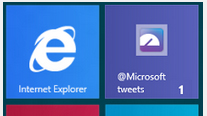Internet Explorer gains web market share as Chrome drops, report finds
IE8 is still on top

A new report on web browser market share suggests that Internet Explorer is still the browser of choice for most users.
The data gathered comes by way of Net Applications, which tracks data from 160 million unique visitors a month across 40,000 websites. In February, Microsoft's browser accounted for 55.82 percent of global users, showing a slight bump from January where it held a 55.14 percent market share.
A breakdown shows that Internet Explorer 8 and 9 are the most popular versions, holding 23.38 percent and 21.67 percent of the audience respectively.
Internet Explorer 10, on the other hand, has fewer users than even older versions of the browser, with 1.58 percent. That may change with the browser now available for Windows 7, which may have been released too late in February to make a difference.
Chrome reaches a new low
Firefox, which released Firefox 19 last month, had the second highest global browser market share with 20.12 percent, a small gain from its 19.94 percent in January.
Meanwhile Chrome, which also released a new version in February, suffered a drop in market share down to 16.27 percent.
This is the first month that Chrome has dropped below 17 percent since September 2011, and follows after three months of decline at the end of 2012.
Get daily insight, inspiration and deals in your inbox
Sign up for breaking news, reviews, opinion, top tech deals, and more.
Even Safari and Opera, which only make up 5.42 and 1.82 percent of users respectively, saw increases last month.
On the bright side, the latest version of Chrome has an adoption rate that is almost neck and neck with Firefox 19, though that could have more to do with automatic updates than actual user interest.
It is important to point out another popular market share watch site - StatCounter - found that Chrome came in first with 37.09 percent, followed by IE at 29.82 percent and Firefox at 21.34 percent.
StatCounter, however, relies on 15 billion page views to gather its data, meaning Net Applications' info might be more accurate.
Whatever the case, Chrome and IE are clearly butting heads for browser dominance, leaving the other browsers behind.
Via The Next Web